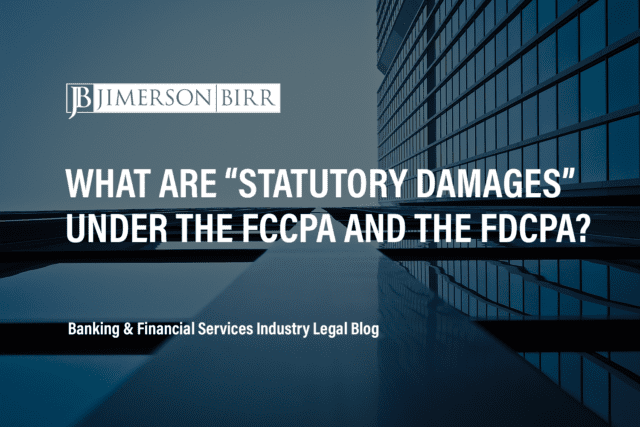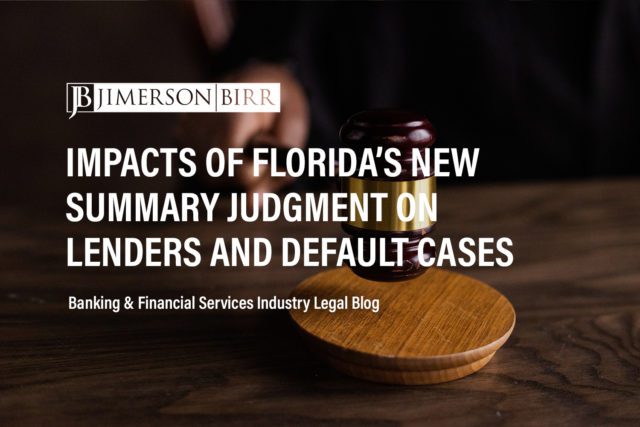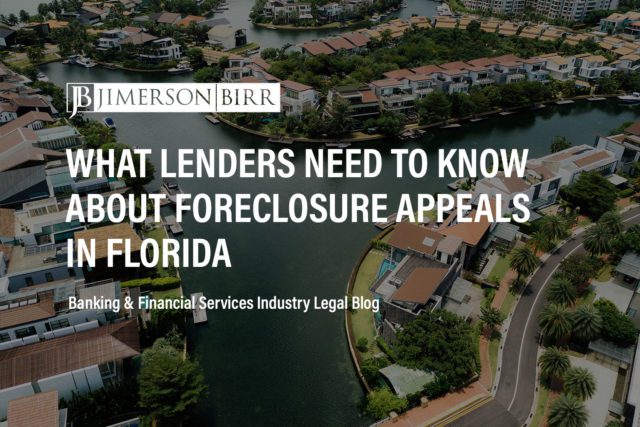How do lender liability and consumer law defense affect banking companies?
Lender liability and consumer law defense play a crucial role in shaping the legal landscape for banking companies, impacting their risk exposure, regulatory compliance, reputation, and financial stability. Banking companies are subject to a myriad of laws and regulations governing lending practices, consumer protection, fair lending, and financial services, including the Uniform Commercial Code (UCC) and various federal statutes.
Effective defense against lender liability and consumer claims requires banking companies to navigate complex legal requirements, mitigate legal and regulatory risks, and protect their interests while maintaining compliance with applicable laws and regulations. Banking companies may face a wide range of legal challenges and disputes, including deposit account and collection disputes, allegations of predatory and unfair lending practices, statutory actions under state and federal deceptive trade practices acts, foreclosure and account servicing disputes, fiduciary duty claims, and consumer fraud and negligence actions.
In response to these challenges, banking companies must develop robust compliance programs, risk management strategies, and legal defense mechanisms to safeguard their interests and mitigate exposure to litigation and regulatory enforcement actions. This includes implementing policies, procedures, and controls to ensure compliance with legal requirements, conducting thorough due diligence on lending practices, customer interactions, and regulatory obligations, and addressing consumer complaints and disputes in a timely and effective manner.
Need help regarding lender law and consumer liability defense? Schedule your consultation today with a top banking attorney.
In Florida, which laws and regulations apply to lender liability and consumer law defense?
In Florida, lender liability and consumer law defense are governed by a combination of state and federal laws, regulations, and court rulings. Some of the key laws and regulations that apply to lender liability and consumer law defense in Florida include:
- Florida Uniform Commercial Code (Florida Statues, Chapter 679): The Florida UCC governs secured transactions, including the creation, perfection, and enforcement of security interests in personal property. Article 9 of the UCC establishes rules for secured transactions, including the rights and obligations of lenders and borrowers, foreclosure procedures, and remedies for default.
- Florida Deceptive and Unfair Trade Practices Act (FDUTPA): FDUTPA prohibits unfair methods of competition, unconscionable acts or practices, and deceptive trade practices in trade or commerce. It provides consumers with legal remedies for deceptive or unfair conduct by businesses, including banking companies, and allows for enforcement actions by the Florida Attorney General.
- Florida Consumer Collection Practices Act (FCCPA): The GLBA is a federal law that governs the privacy and security of consumer financial information held by financial institutions, including banks. While not specific to garnishment or subpoena response, the GLBA imposes requirements for safeguarding customer information and may impact the disclosure of financial records in response to subpoenas or court orders. The corresponding federal law, entitled the Fair Debt Collection Practices Act, can be found here.
- Florida Fair Lending Act (FFLA): FFLA prohibits discriminatory lending practices based on race, color, religion, national origin, sex, marital status, age, or disability in credit transactions. It prohibits lenders from engaging in practices that result in disparate treatment or disparate impact on protected classes of borrowers. The corresponding federal law, entitled the Truth in Lending Act, can be found here.
- Federal Consumer Protection Laws: In addition to state laws, federal consumer protection laws such as the Real Estate Settlement Procedures Act (RESPA), Fair Credit Reporting Act (FCRA), Equal Credit Opportunity Act (ECOA), and others may apply to lender liability defense and consumer protection litigation in Florida
What are common issues regarding lender liability and consumer law defense that lead to litigation?
Several common issues related to lender liability and consumer law defense can lead to litigation:
- Allegations of Predatory Lending Practices: Litigation may arise from allegations of predatory lending practices, including unfair, deceptive, or abusive practices that exploit vulnerable borrowers. This may include claims of high-pressure sales tactics, steering borrowers into unaffordable loan products, or failing to disclose material terms and risks associated with loans.
- Allegations of Unfair or Discriminatory Lending Practices: Lenders may be sued for alleged unfair or discriminatory lending practices, including disparate treatment or disparate impact on protected classes of borrowers. This may involve claims of discrimination based on race, ethnicity, gender, age, or other protected characteristics in the underwriting, pricing, or servicing of loans.
- Foreclosure Defense and Servicing Disputes: Litigation may arise from foreclosure defense and servicing disputes, including challenges to foreclosure proceedings, loan modifications, and loss mitigation efforts. Borrowers may allege errors, misconduct, or violations of legal requirements in the foreclosure process or loan servicing activities, leading to claims for wrongful foreclosure, breach of contract, or unfair trade practices.
- Fiduciary Duty Claims: Lenders and financial institutions may face litigation for alleged breaches of fiduciary duties owed to borrowers or consumers. This may include claims of conflicts of interest, self-dealing, or failure to act in the best interests of borrowers in connection with loan origination, servicing, or collection activities.
- Consumer Fraud and Negligence Actions: Lenders may be sued for consumer fraud or negligence in connection with lending practices, marketing materials, disclosures, or representations made to borrowers. This may involve allegations of misrepresentation, concealment of material facts, negligent underwriting, or failure to exercise reasonable care in the provision of financial products or services.
We are value-based attorneys at Jimerson Birr, which means we look at each action with our clients from the point of view of costs and benefits while reducing liability. Then, based on our client’s objectives, we chart a path to seek appropriate remedies.
To determine whether your unique situation may necessitate litigation, please contact our office to set up your initial consultation.
What steps should businesses take to minimize the risk of litigation over lender liability and consumer law defense?
- Comprehensive Compliance Programs: Establish comprehensive compliance programs that address all relevant state and federal laws and regulations governing lending practices and consumer protection. Regularly review and update policies, procedures, and controls to ensure compliance with legal requirements and industry best practices.
- Training and Education: Provide ongoing training and education to employees involved in lending and consumer finance activities to ensure awareness of legal requirements, ethical standards, and compliance obligations. Training should cover topics such as fair lending, anti-discrimination laws, disclosure requirements, and debt collection practices.
- Robust Documentation Practices: Maintain accurate and comprehensive documentation of all lending transactions, including loan applications, disclosures, agreements, correspondence, and servicing records. Ensure that all documentation is complete, accurate, and consistent with legal requirements to mitigate disputes and litigation risks.
- Transparent and Fair Practices: Adopt transparent and fair lending practices that prioritize customer education, informed decision-making, and fair treatment of borrowers. Provide clear and accurate disclosures of loan terms, fees, and risks to borrowers, and avoid unfair, deceptive, or abusive practices that may lead to litigation or regulatory scrutiny.
- Effective Risk Management: Implement effective risk management strategies to identify, assess, and mitigate legal and regulatory risks associated with lending and consumer finance activities. Conduct regular risk assessments, internal audits, and compliance reviews to identify potential issues and implement corrective actions proactively.
- Customer Communication and Resolution: Establish effective communication channels with customers to address concerns, resolve disputes, and prevent escalation of issues. Implement customer-friendly complaint resolution processes that prioritize prompt and fair resolution of customer complaints and inquiries.
- Monitor Legal and Regulatory Developments: Stay informed about changes in laws, regulations, and judicial decisions affecting lending practices and consumer protection. Monitor legal and regulatory developments at the state and federal levels and adjust compliance programs accordingly to ensure ongoing compliance with evolving legal requirements.
Frequently Asked Questions
What is lender liability?
Lender liability refers to the legal responsibility of lenders and financial institutions for their actions or omissions in connection with lending transactions. It encompasses a wide range of legal claims and defenses arising from alleged misconduct, negligence, or violations of legal obligations in the lending and consumer finance context.
What is consumer law defense?
Consumer law defense involves defending against legal claims and actions brought by consumers alleging violations of consumer protection laws, unfair or deceptive trade practices, fraud, negligence, or other wrongdoing by lenders or financial institutions. It includes defending against claims for damages, injunctive relief, or other remedies sought by consumers in litigation or regulatory enforcement actions.
What are the potential consequences of non-compliance with consumer protection laws?
Non-compliance with consumer protection laws can result in legal liability, regulatory enforcement actions, fines, penalties, reputational damage, and litigation costs for lenders and financial institutions. It can also lead to adverse consequences for consumers, such as financial harm, loss of rights, or denial of access to credit or financial services.
Have more questions about a lender liability or consumer law-related situation?
Crucially, this overview of lender liability and consumer law defense does not begin to cover all the laws implicated by this issue or the factors that may compel the application of such laws. Every case is unique, and the laws can produce different outcomes depending on the individual circumstances.
Jimerson Birr attorneys guide our clients to help make informed decisions while ensuring their rights are respected and protected. Our lawyers are highly trained and experienced in the nuances of the law, so they can accurately interpret statutes and case law and holistically prepare individuals or companies for their legal endeavors. Through this intense personal investment and advocacy, our lawyers will help resolve the issue’s complicated legal problems efficiently and effectively.
Having a Jimerson Birr attorney on your side means securing a team of seasoned, multi-dimensional, cross-functional legal professionals. Whether it is a transaction, an operational issue, a regulatory challenge, or a contested legal predicament that may require court intervention, we remain tireless advocates at every step. Being a value-added law firm means putting the client at the forefront of everything we do. We use our experience to help our clients navigate even the most complex problems and come out the other side triumphant.
If you want to understand your case, the merits of your claim or defense, potential monetary awards, or the amount of exposure you face, you should speak with a qualified Jimerson Birr lawyer. Our experienced team of attorneys is here to help. Call Jimerson Birr at (904) 389-0050 or use the contact form to schedule a consultation.

We live by our 7 Superior Service Commitments
- Conferring Client-Defined Value
- Efficient and Cost-Effective
- Accessibility
- Delivering an Experience While Delivering Results
- Meaningful and Enduring Partnership
- Exceptional Communication Based Upon Listening
- Accountability to Goals











